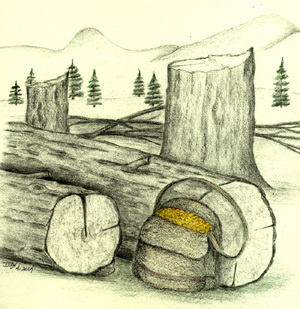Bag of Corn
Title
Bag of Corn
Creator
Description
Molly Ockett's generous nature is well documented by Henry Tufts, who met her in the 1770s. In his autobiography, published in 1807, Tufts records an instance of her generosity to a white man from Pigwacket (Fryeburg), who found himself without food for his family. The man journeyed to Bethel, as he "had used sometimes to visit the Indians for the benefit of hunting, trading, etc., by which means he had contracted some acquaintance with them and had heard that Molly Ockett always kept on hand a considerable quantity of money." Molly Ockett may have known the man from her recent residence in Fryeburg, as she loaned him twenty dollars, but "she rallied him on the score of his coming to borrow of the poor Indians, who (she said) were generally despised by the white people." She charged him to come the next winter and hunt furs to repay her, and this he did gladly, obtaining enough to repay her and have a surplus for his family.
Another tale of Molly Ockett's generosity which came to a less fruitful end concerns the seed corn that she brought from Canada to Colonel McMillan of Conway, New Hampshire, to assist him in improving his crop. On her way to his house, she stopped to visit Squire Richard Eastman and family, leaving the bag of corn by some logs between the house and a nearby mill run by Noah Eastman. While she visited the Squire, someone came along and carried the precious seed into the mill where it was ground into flour. This incident gave rise to a new version of the old "Lucy Lockett" nursery rhyme (sung to the tune of Yankee Doodle): Molly Ockett lost her pocket / Lydia Fisher found it / Lydia carried it to the mill / And Uncle Noah ground it.
Another tale of Molly Ockett's generosity which came to a less fruitful end concerns the seed corn that she brought from Canada to Colonel McMillan of Conway, New Hampshire, to assist him in improving his crop. On her way to his house, she stopped to visit Squire Richard Eastman and family, leaving the bag of corn by some logs between the house and a nearby mill run by Noah Eastman. While she visited the Squire, someone came along and carried the precious seed into the mill where it was ground into flour. This incident gave rise to a new version of the old "Lucy Lockett" nursery rhyme (sung to the tune of Yankee Doodle): Molly Ockett lost her pocket / Lydia Fisher found it / Lydia carried it to the mill / And Uncle Noah ground it.
Original Format
Drawing
Identifier
mollyockett-17

